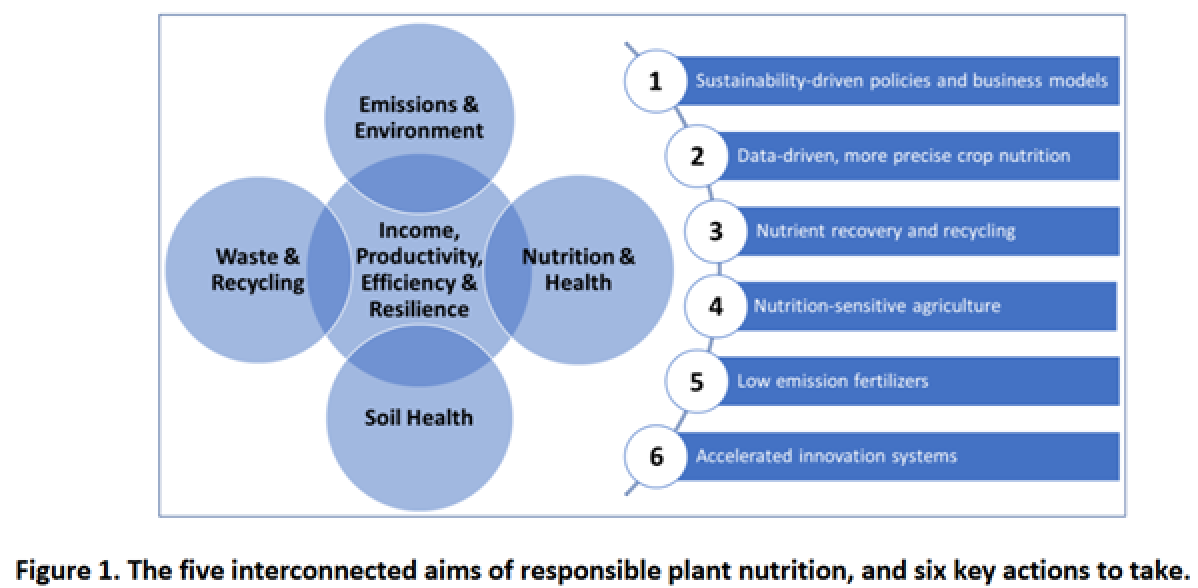Brief prepared by Research Partners of the Scientific Group for the Food Systems Summit
Nutrient inputs play a critical role in raising crops and livestock for food security, human nutrition and other uses in the bioeconomy. Their production and management must change to more effectively nourish crops, reduce harmful environmental impacts caused by nutrient losses and contribute to restoration of soil health. A new paradigm for plant nutrition follows a food system approach in which multiple socioeconomic, environmental and health objectives must be achieved.

World agricultural output has grown at an average annual rate of about 2.2% during the past 60 years, and the increasing access to mineral fertilizers has played an important role. However, in many regions, intensive farming has resulted in nutrient-related externalities and anthropogenic perturbation levels of global nitrogen and phosphorus flows may already exceed limits that are deemed to be a safe operating space for humanity:
Current estimates suggest that at global scale only around 20% of applied nitrogen compounds may reach useful products, with up to 80% lost to the environment in different forms. It is therefore critical to develop an integrated and targeted plant nutrition strategies and practices that minimize trade-offs between productivity and the environment. Following a food system approach, responsible plant nutrition aims to:
- Improve income, productivity, nutrient efficiency and resilience of farmers and businesses supporting them;
- Increase nutrient recovery and recycling from waste and other under-utilized resources;
- Lift and sustain soil health;
- Enhance human nutrition and health through nutrition-sensitive agriculture;
- Minimize greenhouse gas emissions, nutrient pollution and biodiversity loss.
The brief identifies six interdependent actions:
Action 1: Sustainability-driven nutrient policies including ambitious goals for nutrient use, losses and efficiency, tailored to the specific food systems in every country.
Action 2: Data-driven, more precise crop nutrition solutions. Besides high-tech solutions for commercial farming, “low-tech” site-specific nutrient management approaches have shown consistent, and need to be up-scaled to millions of farmers through digitally supported advisory systems and business solutions.
Action 3: Circular economy solutions for greater nutrient recovery and recycling. Crop-livestock integration, less food waste, by-products use and increased nutrient recovery and recycling are key measures to optimize nutrient use efficiency across the full food chain.
Action 4: Nutrition-sensitive farming –producing food crops with higher nutritional value to address persisting as well as emerging mineral nutrient deficiencies. Depending on the context, nutrition-sensitive crop production may include more diverse crop rotations as well as biofortification of staple crops with micronutrients through breeding and/or fertilizers.
Action 5: Energy efficient, low emission fertilizers. Significant reductions in pre-farm greenhouse gas emissions can be achieved by low-carbon emission fertilizer production. Innovation in fertilizer formulation will lead to environmentally-friendly fertilizers that maximize nutrient capture by the crop and minimize losses of nutrients.
Action 6: Accelerated, more open innovation systems for faster translation of new ideas into practice.
| Year of publication | |
| Authors | |
| Publisher | The Scientific Group for the UN Food Systems Summit |
| Originally published | 16 Mar 2021 |
| Knowledge service | Metadata | Global Food and Nutrition Security |
